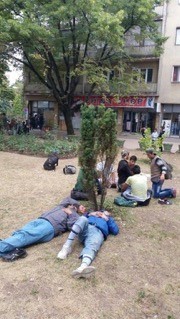Imagine, for a second, your favorite public park. Now imagine that park as a temporary home to thousands of people fleeing war, violence and poverty.
That's what's happening today in Serbia. Since mid-June, an estimated 2,000 migrants -- more than half refugees from war-torn Syria -- have been crossing into that country daily, trying to get to the European Union (EU), where they're seeking a better life.
Throughout the country, public parks, forests and abandoned factories have become way stations for thousands of displaced people.
"The parks in Belgrade are full," explains Dino Mujanovic, project manager for Catholic Relief Services (CRS) Serbia. "The situation is very difficult."
In Serbia's capital city, public spaces are littered with tents. Barefoot refugees huddle together, sleeping on cardboard boxes, a public monument providing their pillow. A toddler sleeps on the ground, tucked into a sleeping bag.
Making the situation worse is the heat. In the summer, temperatures can reach up to 100 degrees Fahrenheit, with high humidity.
"I saw one woman from Syria in a wheelchair. I can't imagine what she's been through," Mujanovic says.
To respond to the crisis, CRS is working with multiple partners to provide relief to migrants in the town of Kanjiza, near the Serbian and Hungarian border, which sees about 1,000 migrants and refugees passing through every day. CRS has rented a facility equipped with beds, bedding, bathrooms and showers to provide people in transit a brief respite. The humanitarian aid agency governed by the United States Conference of Catholic Bishops also is covering the expenses for two interpreters and two doctors. And the organization is providing food and nonfood items -- like shampoo, soap and other necessities -- to migrants in Kanjiza and other locations.
According to Mujanovic, hygiene and shelter are two of the most pressing needs.
And he warns that the situation could worsen in coming months. In September, Hungary is expected to complete a wall along its 115-mile border with Serbia, keeping them from reaching that EU country.
"When the wall is finished, people will be staying here longer ... People will be living harder," Mujanovic says. "They just want to keep going on toward Europe, toward a better life."
Nikki Gamer is covers the Middle East and Europe in the communications department of Catholic Relief Services
Support HuffPost
Our 2024 Coverage Needs You
Your Loyalty Means The World To Us
At HuffPost, we believe that everyone needs high-quality journalism, but we understand that not everyone can afford to pay for expensive news subscriptions. That is why we are committed to providing deeply reported, carefully fact-checked news that is freely accessible to everyone.
Whether you come to HuffPost for updates on the 2024 presidential race, hard-hitting investigations into critical issues facing our country today, or trending stories that make you laugh, we appreciate you. The truth is, news costs money to produce, and we are proud that we have never put our stories behind an expensive paywall.
Would you join us to help keep our stories free for all? Your contribution of as little as $2 will go a long way.
Can't afford to donate? Support HuffPost by creating a free account and log in while you read.
As Americans head to the polls in 2024, the very future of our country is at stake. At HuffPost, we believe that a free press is critical to creating well-informed voters. That's why our journalism is free for everyone, even though other newsrooms retreat behind expensive paywalls.
Our journalists will continue to cover the twists and turns during this historic presidential election. With your help, we'll bring you hard-hitting investigations, well-researched analysis and timely takes you can't find elsewhere. Reporting in this current political climate is a responsibility we do not take lightly, and we thank you for your support.
Contribute as little as $2 to keep our news free for all.
Can't afford to donate? Support HuffPost by creating a free account and log in while you read.
Dear HuffPost Reader
Thank you for your past contribution to HuffPost. We are sincerely grateful for readers like you who help us ensure that we can keep our journalism free for everyone.
The stakes are high this year, and our 2024 coverage could use continued support. Would you consider becoming a regular HuffPost contributor?
Dear HuffPost Reader
Thank you for your past contribution to HuffPost. We are sincerely grateful for readers like you who help us ensure that we can keep our journalism free for everyone.
The stakes are high this year, and our 2024 coverage could use continued support. If circumstances have changed since you last contributed, we hope you’ll consider contributing to HuffPost once more.
Already contributed? Log in to hide these messages.

